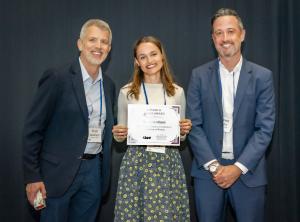By Emily Sellars (Chair) and Jared Rubin, on behalf of a committee that also included Talia Gillis and Nathan Nunn
We received nine excellent submissions from different institutions, disciplines, and methodological perspectives. It was not an easy job, and there were at least 5 or 6 dissertations of extremely high quality. But, we had a task to do. The committee selected three finalists and one award winner.
Honorable Mentions (in alphabetical order)
Martin Castillo-Quintana, “Three Essays on the Political Economy of Organized Crime,” Department of Politics, NYU.
Martin Castillo-Quintana’s dissertation provides new theoretical insight on how organized criminal groups respond to and influence the policymaking process in democratic states, a topic of central importance in much of the world today. In his first essay, Castillo-Quintana develops a dynamic model of the interaction between two rival drug lords and the government to shed light on when and how government repression can be used to control drug trafficking-related violence. The model generates some interesting and counterintuitive policy implications, highlighting some potential upsides of government corruption and downsides of legalization for controlling trafficking-related violence. He extends this research agenda in the second and third essays to consider how electoral incentives shape enforcement actions against organized criminal groups and in turn how these groups may influence the electoral process itself through a combination of vote buying and intimidation. The committee was impressed by the theoretical complexity of this dissertation in taking on a critically important set of policy issues in the world today.
Deniz Sanin, “Essays in Development, Labor, and Gender Economics.” Department of Economics, Georgetown University
In her dissertation, Deniz Sanin provides new theory and evidence on an important and understudied topic: women’s employment opportunities and domestic violence. In her first essay, Sanin provides new clarity on this relationship using a creative research design and data on coffee production in Rwanda in the early 2000s. Sanin shows that the opening and operation of coffee mills, which increased the sale price of coffee and provided new labor market opportunities to women, reduced domestic violence by raising the costs of women’s temporary incapacitation. In her second essay, she extends her analysis to examine the impact of anti-domestic violence legislation in Rwanda. Using rich administrative data, she shows that domestic violence decreases and divorce increases following the 2008 passage of a law allowing for unilateral divorce in cases of violence. In her final essay, she and her coauthor provide a detailed analysis of the design and implemental of parental leave policies in developed democracies through an original structural model incorporating decisions about labor supply, fertility, and human capital accumulation. This dissertation stood out for its attention to theoretical detail, its tackling of several important and understudied topics, and for the creative use of observational data to answer policy-relevant questions on women’s employment from a wide range of settings, from Sweden to Rwanda.
Award winner
Virginia Minni, "Essays on the Allocation, Coordination, and Selection of Workers", Department of Economics, London School of Economics and Political Science
Virginia Minni’s dissertation speaks to a series of questions at the heart of organizational economics. In her first essay, Minni focuses on the allocation of workers within a firm, highlighting the importance of high-performing managers for improving worker productivity. A good manager, she shows, can have a lasting, positive impact on workers’ career trajectories through improving the fit between the available labor pool and specialized job within a firm. To show this, Minni makes use of an incredible dataset of administrative records for a multi-national firm, following over 200,000 workers and 30,000 managers over a 10-year period in 100 countries. Using the lateral rotation of managers as a natural experiment, Minni shows that workers who gain a high-flying manager, one whose own career progression was especially fast, are more likely to move laterally and vertically within the firm. She further shows that this reallocation of talent has important benefits for workers’ longer-term job performance, career progression, and compensation as well as firm profits. Her analysis provides important insight on a topic that is both of central importance to our discipline and extremely challenging to study empirically.
Her second essay provides a different perspective on the role of talent and leadership within organizations using experimental evidence from a very different setting: labor unions in Myanmar. Using two sets of field experiments, Minni and her coauthors provide interesting evidence that union leaders play an important coordinating role in setting expectations for worker behavior and in consolidating consensus around the organizational priorities of the union. In her final essay, Minni and her coauthors use rich administrative data from a multinational firm to provide new evidence on the determinants of differences in female labor force participation across countries. The committee was impressed by the extraordinary empirical breadth of this dissertation as well as the rigor and thoughtfulness of the analysis. Taken together, the essays make an important contribution to our understanding of leadership and labor allocation within firms and organizations.
I would like to add that Minni’s dissertation is at the very heart of the Coasian tradition that makes SIOE the important organization that it is. This is a very well-deserved award for a very promising scholar.

